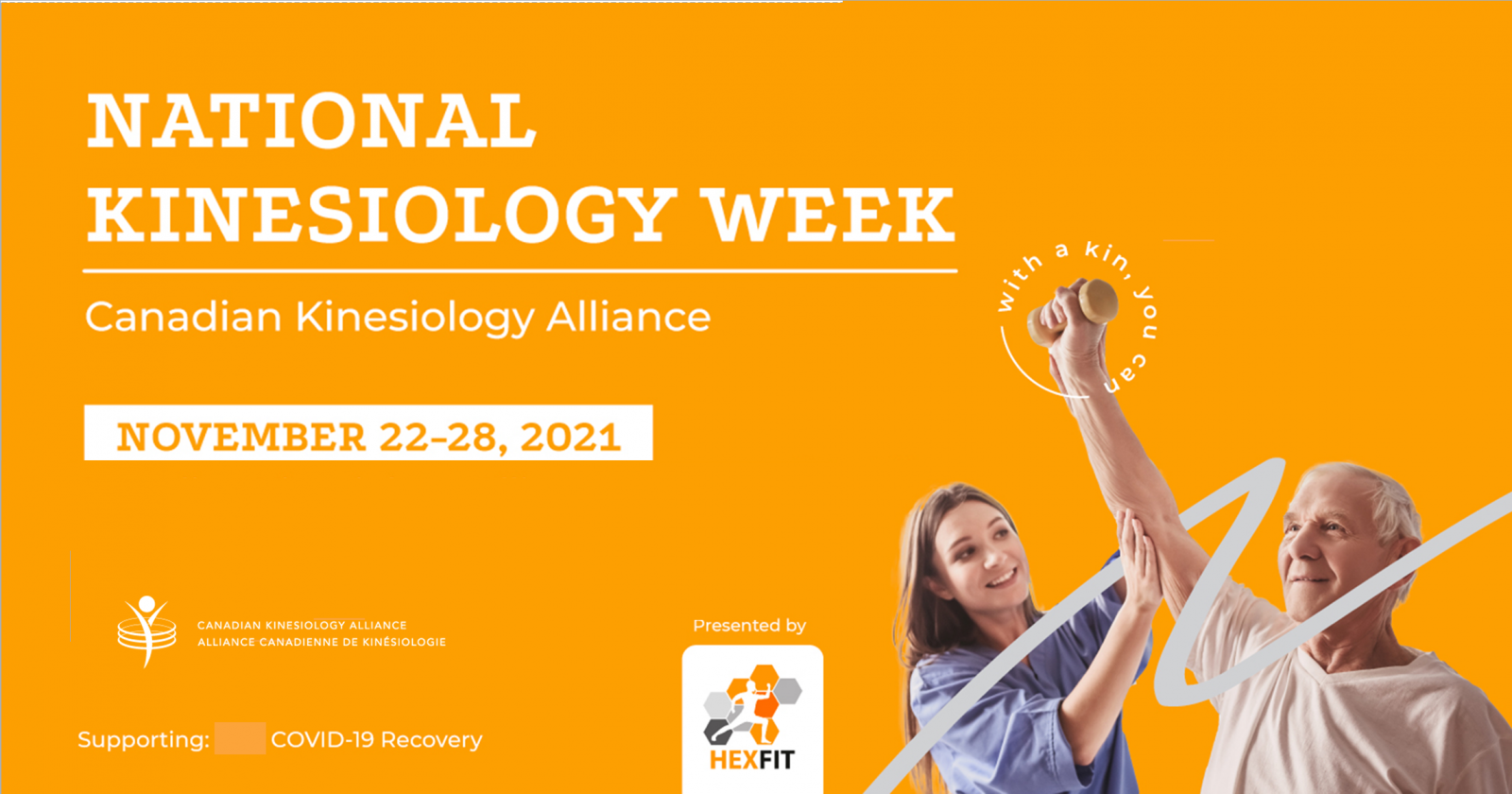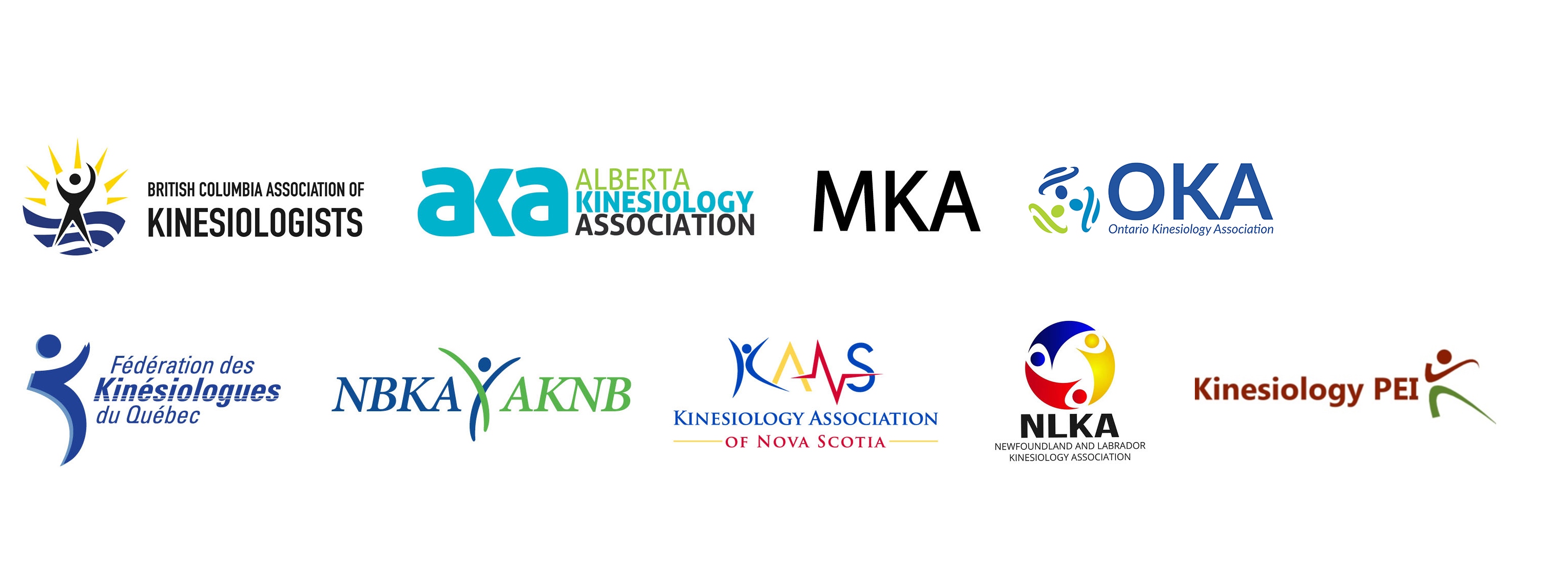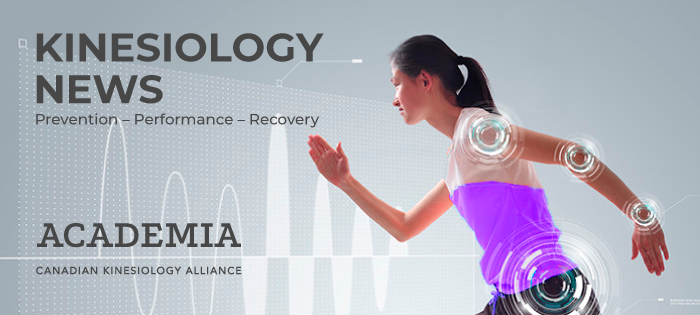
2021 Fall
Vol.1 No.2

CKA #KINVISION2022 STRATEGIC PLAN - YEAR 4 -
What is the CKA working on?
The CKA / ACK is very pleased to report that it has completed the majority of its fourth year of the #KinVision2022 Strategic Plan.
Most recently the CKA informed you of its latest achievements – refer to the previous eNewsletter. In a sprint to the end of the year, the CKA will strive to finalize the following:

- Promote the Forward with COVID-19 Kinesiology Guidelines
- Promote kinesiology through four major events to bring the community together: Kin Case Competition, National Kinesiology Week, Kin Can Conference, and the Canadian Kinesiology Awards
- Further develop relationships with NHOs such as CSEP, CATA, ACE, EIMC, CCUPEKA, etc.
- Hold a KinStartUpKit.ca webinar with its university tour
- Establish a risk management plan
- Renew the five-year agreement with PKAs supporting mutual governance
- Produce an insurance benefit plan campaign
- Begin establishing the research and academia committee
- Survey Kinesiologists about their knowledge and application of accommodation to ensure inclusion when providing services
- Ask university academics and faculty members how the CKA can help talk about the practice of kinesiology to students
- Finalize the review of governance by revising all policies and procedures
- Prepare to launch two new affiliation categories and the new 2022 required competencies
- And more...
Governance Assessment
Early in the year, the CKA / ACK invited proposals from consulting firms to perform a governance assessment of the CKA / ACK's structure, policies and procedures, governance and operations.
From this, a comprehensive diagnostic report guided the current Board of Directors (BOD) and Executive Director (ED) on how to strengthen the organization's governance. The Board has worked throughout the year and is now at the very last step of completing the exercise.
The CKA believes it is important to evaluate one's governance processes to seek a better and stronger future.
Affiliation / Membership
New Record Reached
4,523
Affiliated Kinesiologists in Canada
Thank you for being part of the kinesiology community.
New Five-Year Strategic Plan for 2023-2028
Because the first CKA Strategic Plan is entering its last year in 2022, the Board will be consulting with stakeholders and Kinesiologists next year and then brainstorming to establish another five-year strategic plan for 2023-2028.
Under the current strategic plan, the CKA has developed its governance, its communications with stakeholders and its promotion of kinesiology. It has made the kinesiology community aware of its role and mandate to develop, to promote and to advocate for kinesiology across the country. Major events were created to invite Kinesiologists to network, including an appeal to students and academics/researchers. The structure of kinesiology across the country evolved through our work on the entry-to-profession examination process. The kinesiology community is now more united than ever, with active PKAs in all 10 provinces.
Keep an eye on communications at the start of the new year. The CKA will be looking for your opinion!
As announced previously, the date of the Kinesiology Entry-to-Profession Exam (KEPE) launch has been delayed because its implementation will take more time than predicted. he projected launch date will be confirmed in 2022. The CKA will inform you as soon as the dates are finalized, allowing sufficient time to prepare. In the meantime, should you wish to see what the exam might look like, visit the College of Kinesiologists of Ontario because its exam could be similar: Study Resources.
The CKA and PKAs will be working over the fall to finalize the examination process. The exam will be a membership/affiliation prerequisite for all provinces except Ontario and Québec. New applying Kinesiologists will need to successfully pass the KEPE, managed by an external firm on behalf of the CKA and the PKAs. This option is more aligned with the standards of recognition from the regulator's point of view. As provinces become legislated, it would be easier for individual exams to comply with provincial regulations. This makes the process independent and therefore more credible.
The KEPE will be an online auto-correction exam that tests theoretical knowledge (no practical), including case questions and computer-based remote proctoring, delivered in two parts – 100 competencies questions and 50 provincial jurisprudence questions, for a total of 150 questions. More information and details will be made available in the new year.
An Invitation to Apply
EXAMINATION WORKING COMMITTEE AND/OR
QUESTION WRITING WORKING GROUP
The Canadian Kinesiology Alliance (CKA) is seeking candidates from the practising and academic communities for two new committees related to the Kinesiology Entry-to-Profession Exam (KEPE).
Interested candidates may apply by completing the following form and attaching their resume.
Application deadline: July 30, 5:00 p.m. ET
CKA EXAMINATION
WORKING COMMITTEE
The CKA is seeking four to eight candidates from across Canada. The purpose of the committee is to oversee any matters related to the examination process.
CKA QUESTION WRITING
WORKING GROUP
The CKA is seeking at least two candidates per province for the provincial jurisdiction questions, and four to eight candidates for the core competency questions. The purpose of the working group is to create exam questions for the examination process
Apply Now
New Insurance Program
The CKA National Insurance Program, which includes professional liability insurance and general commercial liability coverage, has served Kinesiologists well thus far. As we come to the end of a five-year agreement cycle, the CKA designated a working group to review the current policy and to suggest recommendations. The working group wished to better align the policy terms with the ever-evolving modalities and scope of the kinesiology profession. Their work led to a request for proposal (RFP) to underwriters in the insurance industry that specialize in health care provider coverage.
Having completed its due diligence in trying to find the best partners for Kinesiologists, the CKA is pleased to announce a new agreement with the same broker (Prolink) and underwriter (Trisura).
The upgrades and improvements to our insurance coverage are amazing and in fact strengthen our profession. The new outstanding program offers the following:: no more riders (e.g., reflexology), recognition of dual profession, clearer manual therapy vs massage therapy, coverage beginning at $2M to $10M for $1 more compared with the current program, and $1 more for administration fees. This is the best program for three reasons:
- Experience and stability underwriting the current CKA / ACK program
- Most competitive E&O and CGL premiums for most coverage options
- No surcharging or underwriting approvals required for different areas of professional practice.
New Standard Competencies for 2022
The CKA wishes to remind you as we approach the renewal period that new competencies are required for members in 2022. A new set of competencies will be promoted as the standards of the profession across the country.
These competencies are deemed necessary to practise kinesiology in Canada. The competency list will serve in decision making such as in membership/affiliation registration requirements and in continuing education credit requirements.
This competency list was established to include as many university programs as possible to maximize access to membership.
These new standards will become effective as of January 2022.
We invite students of programs that do not meet the standard requirements to consult the new CKA competency list and choose the requisite courses now to earn the expected competencies for affiliation in 2022.
Read More

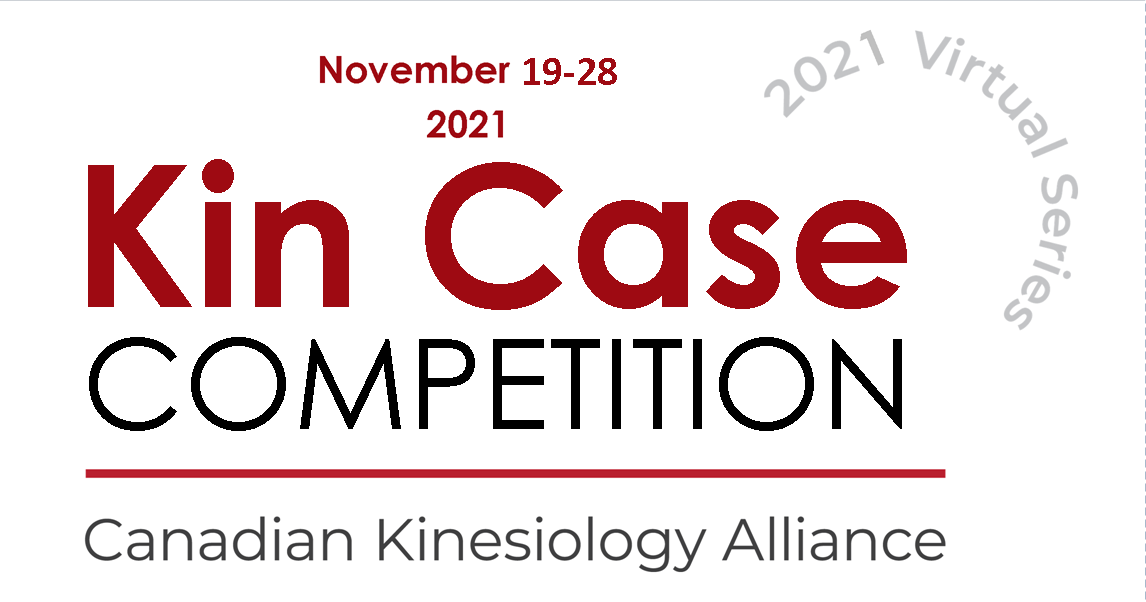 Have you registered
Have you registered
YOUR TEAM?
The Kinesiology Case Competition is a national competition for students in the third and fourth years of Canadian university kinesiology, human kinetics and physical activity programs. Up to 24 teams from provinces throughout the country participate in the week-long event. The competition offers participants great opportunities to meet new people and network with practising Kinesiologists, academics, researchers and prominent businesspeople attending the competition either as judges or sponsors. Participants are encouraged to develop cases and then present and defend them. Most importantly, teams should have fun!
The format is a round-robin tournament consisting of four kinesiology cases. Three of these cases are live presentations about a real-life kinesiology-related challenge. With up to 24 hours (decreasing time per round) to prepare, teams of three students analyze and evaluate unpublished cases using the skills, knowledge and experience they have acquired from their respective kinesiology curriculums. They will have to consult with at least one researcher and one practising Kinesiologist. Students create a presentation that demonstrates their ability to dig into the problem and develop a feasible solution. A panel of judges grade the presentations according to a set list of criteria, using their unique backgrounds, experience and perspectives to critically assess the participants' presentations. Winners receive bursaries and recognition from the kinesiology community.
Spread the news!
Encourage students to participate.
Prizes: Up to $3,000 in bursaries will be offered to outstanding participants in each round.
August 16: OPENING OF REGISTRATION FOR TEAMS
November 10: CLOSING OF REGISTRATION FOR TEAMS
November 12: Release of Case #1 to 24 teams – Qualifier Round
Read More
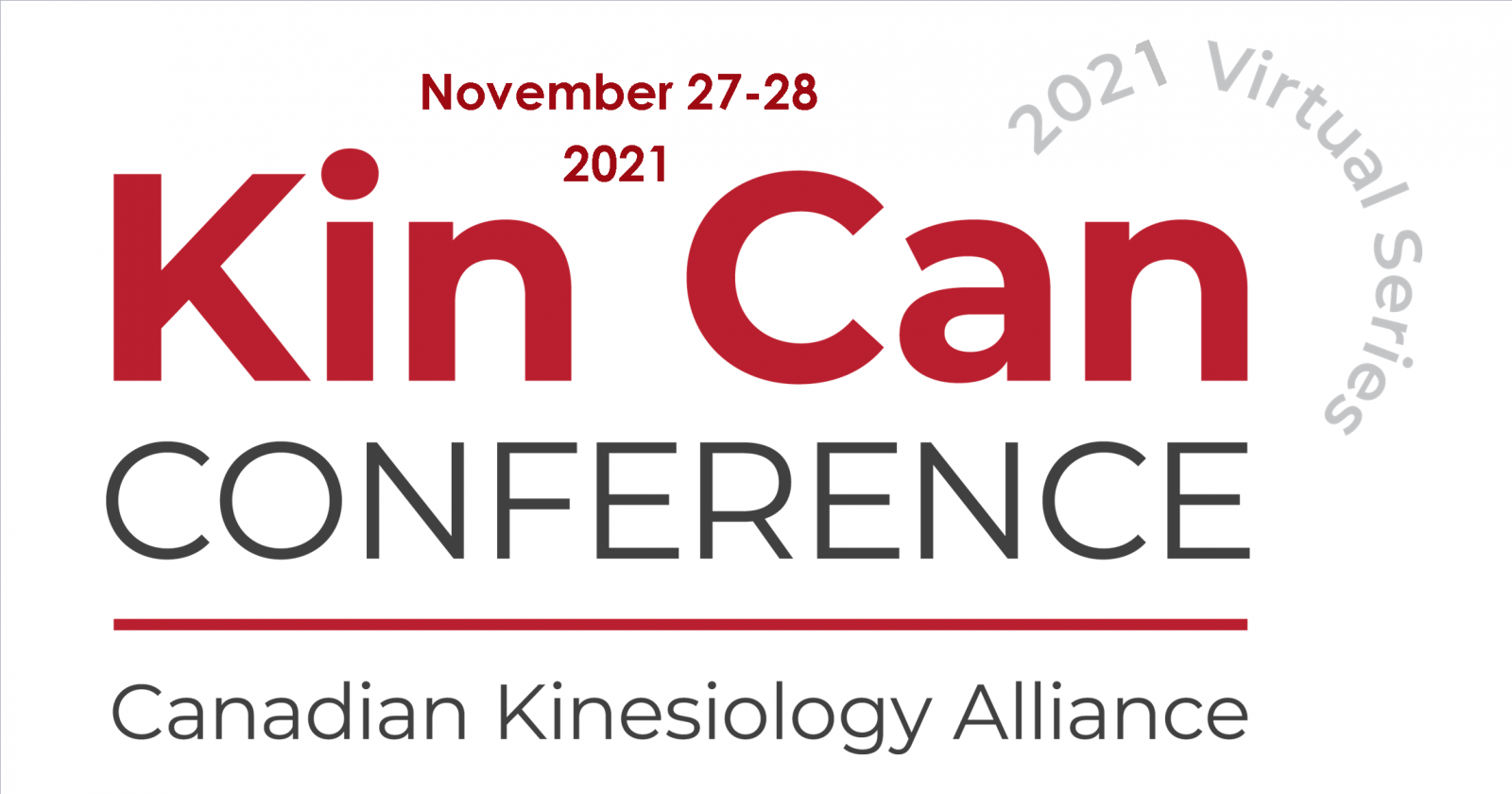 Speakers &
Speakers &
special guest confirmed!
Join us on November 27 & 28, 2021, for the second national virtual kinesiology event
Kin Can Conference!
You will have the opportunity to grow and network, from the comfort of your home, with world-class presenters from many areas of specialized education.
The aim of this conference is to broaden the knowledge of Kinesiologists by sharing scientific insights from the latest research; theoretical and applicative findings; and experiences from the vast field of kinesiology, human movement science, sport and exercise. Through this experience, participants will enhance further cooperation between scholars, institutions and practising Kinesiologists in various projects in different fields of kinesiology.
Speakers and detailed information about the conference will be announced in September. The conference will be held in English, with captions in French.
Participants can earn the most continuing education credits in a single event!
Register today!
Read More

Canadian Kinesiology Awards
Hey! For the 2021 Canadian Kinesiology Awards, we need your help to identify outstanding individuals in the field. Say "I thought of you" to deserving people of kinesiology by nominating them for an award
The Canadian Kinesiology Awards are presented for outstanding achievement in Canada's kinesiology industry. In its second year, the event offers a platform for kinesiology professionals to be recognized and celebrated for their talent, hard work and success.
The Canadian Kinesiology Alliance (CKA) is pleased to recognize Canadian professionals for their achievements. It is expected that the awards will become a globally recognized symbol of excellence, as well as a powerful launching pad for careers, kinesiology clinics and universities looking to establish themselves in a competitive marketplace.
The CKA Awards are an acknowledgment by your peers that you are among the very best in your field in the country. Awards will be granted for outstanding achievement in the following categories: Kin of the Year, Researcher of the Year, Kinesiology Event of the Year and Best Speaker of the 2021 Kin Can Conference.
This year, the winners of the Kin Case Competition will be honored too!
All entries must be submitted by midnight October 31, 2021. The application period is now open.
Finalists will be announced at the closing ceremonies of the Kin Can Conference online on November 28, 2021.
Apply Now!
Download & complete the application form to nominate someone
2021
NATIONAL KINESIOLOGY WEEK
Forward with COVID-19
November 22 to 28, 2021
Kins, get ready to participate!
This year, it's all about the new 2021 COVID guidelines.
The confinement restrictions of the COVID-19 pandemic have significantly changed our lifestyles in terms of reduced daily active living and exercise. Canadians face many challenges as a result of the impact of COVID-19: working from home in settings with poor ergonomics; dealing with the effects of increased stress and anxiety on cognitive well-being and mental health; losing the ability to perform regular daily tasks; gaining weight from the inability to exercise or play sports while being more sedentary.
The 2021 National Kinesiology Week will promote the new CKA Post-COVID-19 Kinesiology Guidelines.
The Canadian Kinesiology Alliance (CKA / ACK), in collaboration with practising Kinesiologists, has created guidelines to provide support for those undergoing recovery or resuming a regular healthy, active lifestyle. Kinesiologists are human movement experts who provide scientific advice and physical activity treatments that improve recovery, health and well-being, through all phases of life.
The CKA / ACK wishes to raise awareness of kinesiology as a solution for long-haulers, seniors and others of all ages as they recover from the impact of COVID-19 on their health and well-being.
During the 2021 National Kinesiology Week, all Kinesiologists in Canada will be tasked with promoting these guidelines, launched in September to coincide with the return to normal life across the country.
See how you, Kinesiologists, can be involved in the public activities – and those for Kinesiologists – by visiting www.nationalkinesiologyweek.ca. Be ready for November!
Start thinking about how you will promote, participate in or organize activities in your community. In preparation for the 2021 National Kinesiology Week, presented by Hexfit, the Canadian Kinesiology Alliance (CKA) reminds Kins to reserve the dates of November 22-28 in their calendars.
A new marketing tool kit will be provided to help you reach health professionals and the general public: new videos will show, and demystify, what a Kin can do for each of these groups. The event also promotes the importance of using a Kinesiologist in one's pursuit of an active lifestyle. All material will be available by October 20, 2021.
Stay tuned! Check your emails regularly.
Last year, KinWeek reached 84 million people in support of Mental Health Awareness. We believe the CKA offers Kinesiologists a great opportunity to reach clients. Get involved!
The 2021 National Kinesiology Week, presented by Hexfit, is in support of mental health and in collaboration with nine provincial associations: BCAK, AKA, MKA, OKA, FKQ, NBKA, NLKA, KANS and KPEI.
Consult the full guidelines.
Visit nationalkinesiologyweek.ca.

CKA Academia Affiliation
The Canadian Kinesiology Alliance has established an academia affiliation for researchers and academics who wish to unify the voice of kinesiology across Canada.
The academia affiliation is open to individuals who do not practise kinesiology and:
- are enrolled in a course of study leading to a master's or doctoral degree in kinesiology from a post-secondary educational institution in Canada that is recognized by the Board,
- are researchers or academics in the field of kinesiology or
- are, or were, employed as a professor/lecturer or faculty member of a post-secondary educational institution in Canada that is recognized by the Board, in a faculty or department that offers courses in kinesiology, human kinetics and related subjects.
Through this membership, researchers will have a stronger presence and voice in the advancement of kinesiology research, the kinesiology profession and the kinesiology degree across Canada.
Through establishing a CKA academia membership program, the Canadian Kinesiology Alliance seeks to unify the voice of kinesiology researchers and professionals. Researchers and academics will benefit from the CKA's goal of connecting the professional fields and promoting and advancing resources and networking opportunities.
Affiliation is for researchers in kinesiology and its directly related fields: biomechanics, health psychology, physiology, nutrition, assistive technology, computer science, biomedical engineering, biotechnology, biology, physics, chemistry and others that impact the advancement of kinesiology research, knowledge of the human body, and skills for practising professionals. Affiliated researchers and academics will be encouraged to participate in order to support their services and knowledge.
For requirements, benefits and fees, visit the CKA website sections I'm Academia and Become Affiliated.
BECOME AFFILIATED
CKA R&A Working Committee
The new R&A working committee has met for the first time late August. They have brainstormed on strategies to recruite researchers and academians. The group is open to accepting those with a kinesiology background who work in rehab sciences, medical science, or other fields. It was clarified that anyone can join the committee if they have a kinesiology background and are involved in research. Then, they proceeded to list activities that could be part of the 2022 Action Plan to be completed by Dec. 2021.
The CKA Reasearch and Academia (R&A) Committee is currently seeking interested candidates.
Researchers and academics are leaders in advancing understanding of the human body, movement and health. This working committee will foster connection of kinesiology researchers throughout the multidisciplinary field of the profession, support translation of research to practice, and expand public awareness of the impact of kinesiology on the health of Canadians.
This is a great opportunity for researchers and academics to be involved in supporting research in all fields of kinesiology, improving career development for researchers, and translating knowledge to the professional practice of kinesiology.
Purpose/Vision of the committee
- To promote and foster high-quality research that is applicable to the practice of kinesiology, the education of Kinesiologists and the innovation of the profession
- To establish a firm scientific knowledge base for the purpose of delivering more effective kinesiology practice and enhancing patient services
Responsibilities of the committee
- To establish our kinesiology researchers as the leaders in evidence-based science advancing the understanding of the human body, human movement and human health, from the cellular to societal level
- To promote how research helps practising Kinesiologists, the public and policy-makers improve the health outcomes of Canadians.
Proposed frequency of meetings
- Quarterly or more frequently if required
Prerequisites
- Be a CKA Academia Affiliate in good standing
- Sign a volunteer agreement on confidentiality
JOIN THE CKA R&A COMMITTEE

Supporting CKA's EVENTS
CKA - CSEP - CCUPEKA - CATA
The CKA is seeking to involve kinesiology-related organizations in its activities in order to increase awareness of kinesiology and to form relationships between the organizations.
The CKA is in the process of establishing contact with CSEP, CCUPEKA and CATA. We have invited these organizations to support the 2021 National Kinesiology Week, to recognize continuing education credits for the Kin Can Conference and to collaborate in sharing information related to the kinesiology industry.
The CKA trusts that this initiative will merit their support. Stay tuned!
Statement
The provincial kinesiology associations have joined with the Canadian Kinesiology Alliance to release an inclusion, equity and anti-racism statement. The initiative is well on its way and will be finalized by the end of October.
The CKA and PKAs are committed to encouraging equity, diversity and inclusion in their administration of policies, programs and activities. The purpose of the policy is to ensure that equity-deserving groups are given a full and inclusive range of opportunities to participate in and lead CKA and PKA programs and activities. With this purpose in mind, this policy is intended to articulate a core set of principles that have led to the development and implementation of directives for how the CKA and PKAs promote equity, diversity and inclusion for all participants in all the association's activities.
Read More
Physical Activity Joint Statement
CKA - ParticipACTION - Active for Life - EIMC - PHE Canada - CSEP
The Canadian Kinesiology Alliance has joined kinesiology-related stakeholders in creating a physical activity statement to be released in the fall. This idea originated from a National Health and Fitness Day group who invited stakeholders such as the CKA, ParticipAction, Active for Life, EIMC, PHE Canada and CSEP.
The goal is to develop and release a joint statement on the importance and safety of physical activity during the pandemic. Ideally, it will be published in a relevant peer-reviewed journal, and it will also contain a consensus statement summary that organizations and individuals can promote through their own networks, including (1) a one-page summary statement with a short commentary from the respective organization and links to their own resources that are relevant to the statement, (2) a link to the complete joint statement on the host website and (3) a link to the future publication of the joint statement in a peer-reviewed journal.
The statement will be adapted to share with various stakeholders (e.g., general public, policy, health, education).
The CKA is proud to be an active leader promoting movement through kinesiology across the country. The CKA works with a broad group of stakeholders that include industry, government and other health professional associations as it fulfills its mission to promote and develop kinesiology, and to unify and harmonize the governance and standards for kinesiology within Canada.
Insurance Benefit Plan Campaign
"Join the Movement"
As previously announced, the CKA and PKAs, in an initiative from the OKA, are running an Insurance Benefit Plan Campaign from Sept. to Dec. 2021. The campaign is being held in each province via the PKAs under the theme "The Kinesiology Movement!" The goal is to reach more than 1,000 insurance company claim managers and insurance advisors and corporate human resources managers across Canada.
We are getting results even in so little time. Major insurance companies are interested in knowing more about kinesiology. Talks with Greenshield, Co-Operators, Empire and Mercer are being held on an exploratory basis. These companies may join the existing list: Manulife, Desjardins, Sun Life, Blue Cross, IA, Claimsecure, SSQ and Great West (Canada Life).
The CKA and PKAs wish to increase meaningful initiatives targeting insurance companies and corporations to raise awareness of kinesiology services as insured treatments (reimbursable to clients). This initiative provides the opportunity for a CKA and/or PKA representative to inform this primary market of the advantages of including kinesiology services in their health benefit plans. We feel that a unified national campaign would multiply the promotional materials and help reach the target market with a bigger "buzz" or "push."
Given the often-national nature of the insurance and health benefits sector, a national campaign supported by province-specific elements will increase the impact of the program by ensuring a common message that is consistently branded.
Some activities include snail mail mailing, targeted email mailing, webinar or in-person presentations of "How to Use Your Kinesiology Benefit," visits with insurance and corporate HR representatives, social media campaign posts and shares, and follow-up calls to insurance and corporate HR representatives.
The goal? To help Kinesiologists get their services reimbursed by major insurance companies.

KinStartUpKit University Tour 
The CKA continues touring university campuses (virtually) to present the #KinStartUpKit (KSUK) to as many university students as possible in collaboration with PKAs and university liaisons. The goal is to inform students (who are about to finish their degree in kinesiology) about transitioning from academia to practice and help them decide whether to pursue postgraduate studies, start a career or a business or follow another path.
Since the beginning of the fall semesters, despite COVID-19 restrictions and university closures, Julie Johnson, CKA Program Coordinator of the #KinStartUpKit seminars, has given twice as many presentations as last year. This initiative has successfully dispelled some of the misinformation about what is needed to launch a career in the profession.
The refreshed presentation includes new information and frequently asked questions. We are reaching out to professors, TAs, academic advisors, student groups/societies/unions and so on in each province to push for fall and winter bookings to be completed by the end of December 2021. A social media campaign will be launched in the coming days.
Should anyone wish to organize a presentation, contact Julie Johnson at coordinator@cka.ca.
Get Published ?
New Hub of Information
"Knowledge is power - scientia est potentia" they say. Information is power – but only when it is the right information The Canadian Kinesiology Alliance (CKA) wished to make information more available through its communication tools ie websites and social network. It wishes to be "hub for Kin" – a hub of information. The CKA website newly refreshed now holds information and links to PKAs events and social network news, a new directory giving Kins more national exposure, and many answers and tricks for kins to give their clients.
The CKA Recruiting Editorial Collaborators
Have you ever written a few articles or come across research relating to kinesiology practice that would be of interest to all in the profession? The CKA is looking for content, related to Kinesiology to share with our readers of the eNewsletter, CKA website and other means to come on various subjects i.e.Science of Kinesiology, Awareness of the profession, Best practice stories, Better your business, etc.
Send us your information to info@cka.ca: News, events, best practice ideas, challenges etc.

Assessment of Postural Stability During an Upper Extremity Rapid, Bimanual Motor Task After Sport-Related Concussion
Cameron S. Mang, Tara A. Whitten, Madeline S. Cosh, Sean P. Dukelow, and Brian W. Benson
Journal of Athletic Training, October 16, 2020
Sport-related concussion (SRC) is defined as a traumatic brain injury induced by biomechanical forces that are transmitted to the brain through an impact to the head, neck, or body.1 As with all types of traumatic brain injury, SRC is associated with wide-ranging clinical signs and symptoms (eg, sensory, motor, cognitive, emotional).2 However, it is distinct from other traumatic brain injuries in being generally associated with subtle neurologic impairments reflective of a functional disturbance rather than a structural injury (ie, no abnormalities detected on standard structural clinical neuroimaging).1 The multidimensional, subtle nature of the deficits involved in SRC present a unique challenge to neurologic assessment and return-to-sport decision making.2 For example, if undetected, such subtle impairments could impair sport performance enough to increase the risk of further injury,3,4 particularly in a high-risk, high-speed sporting context. Currently, many neurologic assessments used for SRC rely on reporting of patient symptoms and subjective identification of clinical signs,5 which, although clinically efficient, lack precision and are susceptible to both patient and clinician bias. Therefore, better tools are needed to efficiently, precisely, and objectively assess multiple domains of neurologic function after SRC.
Read More
Impact of Activity Monitoring on Physical Activity, Sedentary Behavior, and Body Weight during the COVID-19 Pandemic
Jacob E. Barkley, Gregory Farnell, Brianna Boyko, Brooke Turner, and Ryan Wiet
International Journal of Environmental Research and Public Health, July 15, 2021
Decreases in individuals' physical activity and increases in sedentary behavior and bodyweight have been reported during the COVID-19 pandemic. The present study assessed the ability of physical activity monitoring, which may promote physical activity and discourage sedentary behavior, to mitigate these negative outcomes. An evaluation of university samples (N = 404, 40.5 ± 15.4 years) of self-reported physical activity, sedentary behavior, and bodyweight prior to the closure of campus due to the pandemic in March of 2020 and again at the time of the survey administration (May-June 2020) during pandemic-related restrictions was performed. Participants also reported whether they did (n = 172) or did not (n = 232) regularly use physical activity monitoring technology. While physical activity was unchanged during the pandemic (p 0.15), participants significantly increased sitting by 67.8 ± 156.6 min/day and gained 0.64 ± 3.5 kg from pre-campus to post-campus closure (p
Read More
The Influence of an Acute Bout of Moderate-Intensity Cycling Exercise on Sensorimotor Integration
Katlyn E. Brown, Jason L. Neva, Cameron S. Mang, Briana Chau, Larissa K. Chiu, Beatrice A. Francisco, William R. Staines, and Lara A. Boyd
European Journal of Neuroscience, July 21, 2020
Acute cycling exercise can modulate motor cortical circuitry in the non-exercised upper-limb. Within the primary motor cortex, measures of intracortical inhibition are reduced and intracortical facilitation is enhanced following acute exercise. Further, acute cycling exercise decreases interhemispheric inhibition between the motor cortices and lowers cerebellar-to-motor cortex inhibition. Yet, investigations into the effects of acute exercise on sensorimotor integration, referring to the transfer of incoming afferent information from the primary somatosensory cortex to motor cortex, are lacking. The current work addresses this gap in knowledge with two experimental sessions. In the first session, we tested the exercise-induced changes in somatosensory and motor excitability by assessing somatosensory (SEP) and motor evoked potentials (MEPs). In the second session, we explored the effects of acute cycling exercise on short- (SAI) and long-latency afferent inhibition (LAI), and afferent facilitation. In both experimental sessions, neurophysiological measures were obtained from the non-exercised upper-limb muscle, tested at two time points pre-exercise separated by a 25-min period of rest. Next, a 25-min bout of moderate-intensity lower-limb cycling was performed with measures assessed at two time points post-exercise. Acute lower-limb cycling increased LAI, without modulation of SAI or afferent facilitation. Further, there were no exercise-induced changes to SEP or MEP amplitudes. Together, these results suggest that acute exercise has unique effects on sensorimotor integration, which are not accompanied by concurrent changes in somatosensory or motor cortical excitability.
Read More
Physical Fitness and Exercise during the COVID-19 Pandemic: A Qualitative Enquiry
Harleen Kaur, Tushar Singh, Yogesh Kumar Arya, and Shalini Mittal
Frontiers in Psychology, October 29, 2020
The COVID-19 pandemic has brought this fast-moving world to a standstill. The impact of this pandemic is massive, and the only strategy to curb the rapid spread of the disease is to follow social distancing. The imposed lockdown, resulting in the closure of business activities, public places, fitness and activity centers, and overall social life, has hampered many aspects of the lives of people including routine fitness activities of fitness freaks, which has resulted in various psychological issues and serious fitness and health concerns. In the present paper, the authors aimed at understanding the unique experiences of fitness freaks during the period of lockdown due to COVID-19. The paper also intended to explore the ways in which alternate exercises and fitness activities at home helped them deal with psychological issues and physical health consequences. Semi-structured telephone interviews were conducted with 22 adults who were regularly working out in the gym before the COVID-19 pandemic but stayed at home during the nationwide lockdown. The analysis revealed that during the initial phase of lockdown, the participants had a negative situational perception and a lack of motivation for fitness exercise. They also showed psychological health concerns and overdependence on social media in spending their free time. However, there was a gradual increase in positive self-perception and motivation to overcome their dependence on gym and fitness equipment and to continue fitness exercises at home. Participants also tended to play music as a tool while working out. The regular fitness workout at home during the lockdown greatly helped them to overcome psychological issues and fitness concerns.
Read More


Fall into Fitness
By Catarina Martins
As the long warm days of summer come to an end, and we round the corner to Fall, many of us may find ourselves returning to familiar routines or starting new ones. This Fall, take advantage of new beginnings by establishing new and fresh physical activity goals or by refreshing old ones. Whether returning to an existing fitness routine, or looking to establish a new one, the first step is to develop a SMART plan. This begins by setting a reasonable goal for your physical activity which is specific, measurable, attainable, realistic and time bound.
Read More
Mindfulness as a Means to Keep Moving
By Nolan Turnbull, Kinesiologist
The unpredictable nature of the pandemic has made taking time for oneself and maintaining healthy lifestyle behaviours such as physical activity more difficult than ever. Mindfulness is a simple practice that anyone can use to help address stress and uncertainty, and to achieve lifestyle and physical activity related goals.
Read More

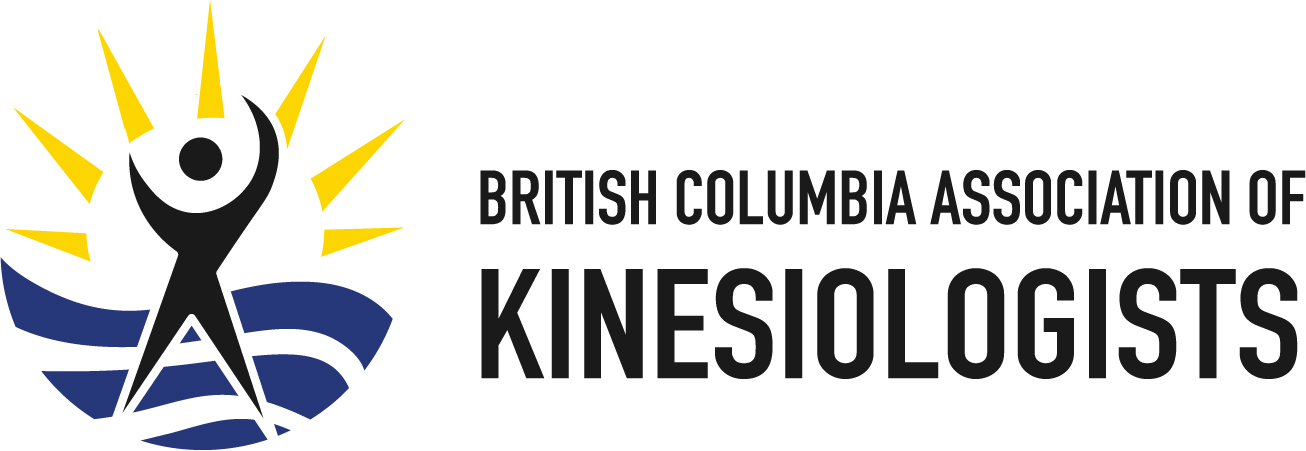 BCAK has launched a fall advertising campaign to reach out to the public and to employers and encourage adding kinesiology services to benefits plans. This campaign is on BC's number one television news channel, Global News, and BC 1 and consists of a static Ad and a 15-second advertisement that shows kinesiologists and clients working together. The campaign runs 144 times from September 6 to November 29, 2021, and is designed to drive traffic to BCAK's Find a Kinesiologist website page.
BCAK has launched a fall advertising campaign to reach out to the public and to employers and encourage adding kinesiology services to benefits plans. This campaign is on BC's number one television news channel, Global News, and BC 1 and consists of a static Ad and a 15-second advertisement that shows kinesiologists and clients working together. The campaign runs 144 times from September 6 to November 29, 2021, and is designed to drive traffic to BCAK's Find a Kinesiologist website page.

The AKA has been working very closely with the UofA in launching their first ever KSR case competition! Integrating with the case competition, the AKA has collaborated with a number of educational partners in launching the pilot for Kin School. We hope to further develop this opportunity for future years more to come! In addition, we have released two podcast episodes to-date listen here. This was done to help support students entering into their career as Kinesiologists. Lastly, we continue to build stronger relationships with post-secondary institutions throughout Alberta.
We are always seeking new volunteers and collaborators on projects who share the same passion as us. If you are interested in getting involved, please email: admin@albertakinesiology.ca
SK
SK is in the last process of becoming a CKA-recognized provincial kinesiology association under the name of Kinesiology Association of Saskatchewan (KAS). They should be fully on board ready for renewals in November 2021 and active with other PKAs in 2022. Stay tuned!
Manitoba is still working at establishing a strategy to grow membership. Other activities are slowly getting organized.
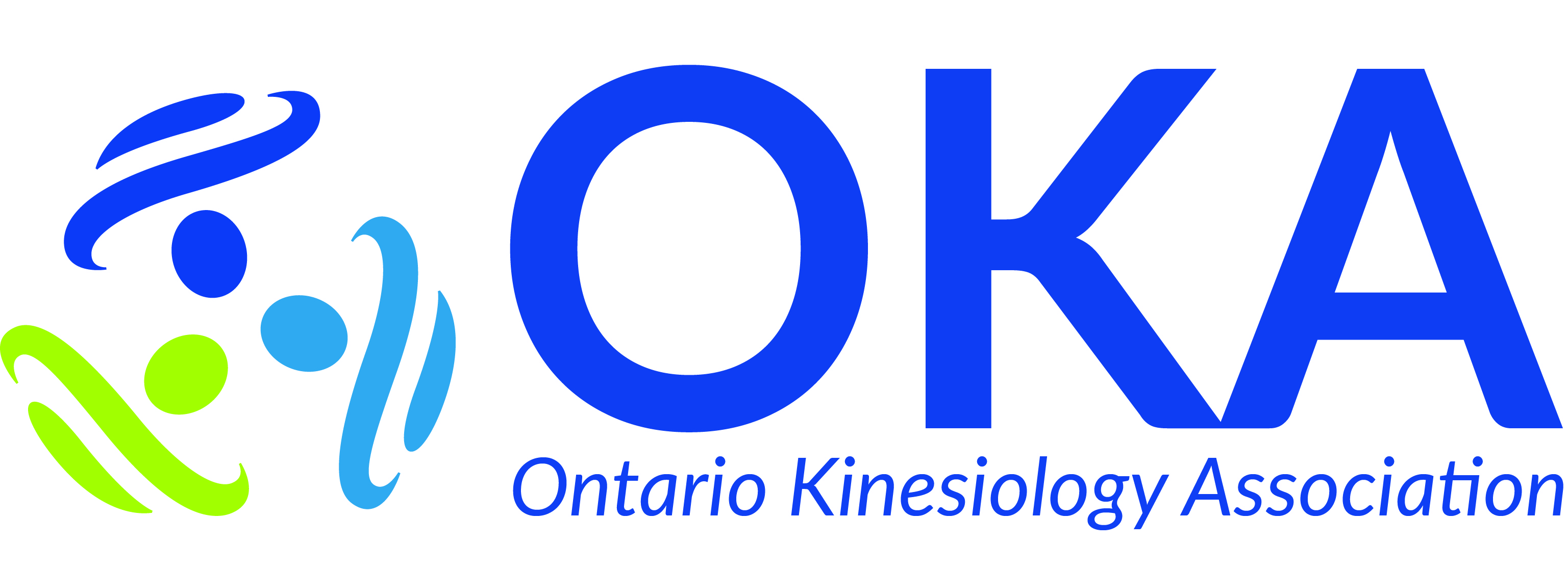 OKA is active in reviewing the status of their strategic plan. An extensive Insurance Benefit Plan Campaign has been launched and the CKA and other PKAs have joined in. A new onboarding guideline was developed to greet new members of their Board of Directors. K.E.E.N. is still in expansion, continually adding new material, with the help of its coordinator for which her mandate was extended.
OKA is active in reviewing the status of their strategic plan. An extensive Insurance Benefit Plan Campaign has been launched and the CKA and other PKAs have joined in. A new onboarding guideline was developed to greet new members of their Board of Directors. K.E.E.N. is still in expansion, continually adding new material, with the help of its coordinator for which her mandate was extended.
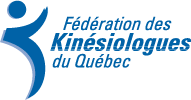
The editorial board of the Actualité et dossier en santé publique (ADSP), a quarterly review of the High Council of Public Health on physical and sporting activity as well as chronic diseases in France, contacted us to write an article on Quebec's vision of physical activity as a management tool for chronic diseases. We took the opportunity to talk about the essential duo formed by the kinesiologist and physical activity.
Read the article (in French)
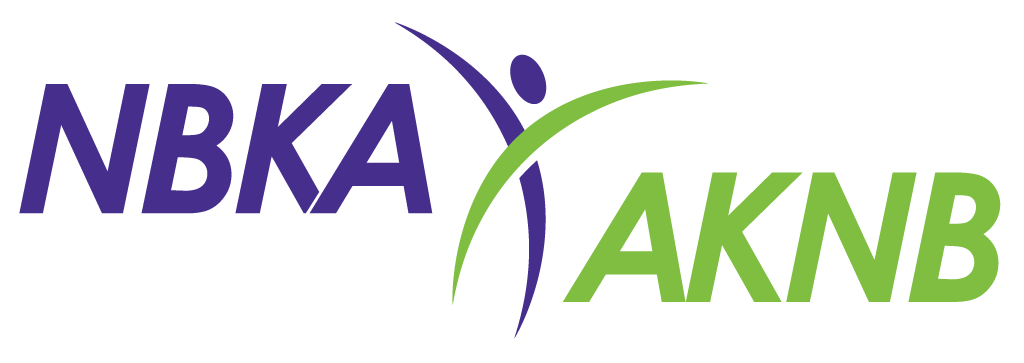 L'AKNB se prépare pour son AGA en novembre et à rencontrer ses membres. Cette rencontre annuelle nous permettra de resserrer les liens avec nos membres et à renforcer notre conseil d'administration pour la prochaine année
L'AKNB se prépare pour son AGA en novembre et à rencontrer ses membres. Cette rencontre annuelle nous permettra de resserrer les liens avec nos membres et à renforcer notre conseil d'administration pour la prochaine année
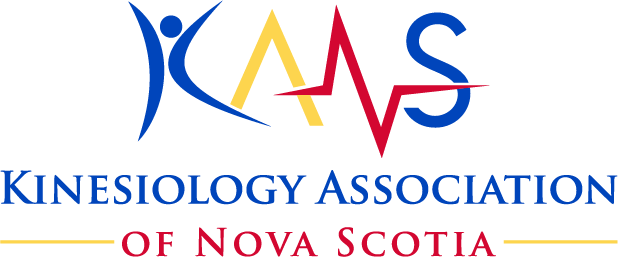 KANS is currently working on touching base with local university students about what our association has to offer! We are also working on a few other initiatives in collaboration with the CKA and within Nova Scotia. Thus far KANS has had a very productive year and is looking forward to the rest of 2021.
KANS is currently working on touching base with local university students about what our association has to offer! We are also working on a few other initiatives in collaboration with the CKA and within Nova Scotia. Thus far KANS has had a very productive year and is looking forward to the rest of 2021.
 Kinesiology PEI is working on updating our professional practice documents to make them consistent with other Atlantic Provinces. We are also working with other provinces to offer more professional development opportunities for our members.
Kinesiology PEI is working on updating our professional practice documents to make them consistent with other Atlantic Provinces. We are also working with other provinces to offer more professional development opportunities for our members.
 The NLKA has been asked to represent 'other health care professionals' on a government/university organized committee that will tackle big topics in health care in our province. They are working to begin process to legislation; have applied to the government to join the Council with other professionals; and are now on the committee working on the renewal of the Health Accord Reform – a first that Kinesiologists can sit at the same table as other professionals.
The NLKA has been asked to represent 'other health care professionals' on a government/university organized committee that will tackle big topics in health care in our province. They are working to begin process to legislation; have applied to the government to join the Council with other professionals; and are now on the committee working on the renewal of the Health Accord Reform – a first that Kinesiologists can sit at the same table as other professionals.
EMPLOYMENT OPPORTUNITIES
| Search jobs |

In New Brunswick, this position requires the applicant to be multi-disciplinary in the range of their teaching capacity in kinesiology, and able to teach both lecture and laboratory content required for the BA in Kinesiology, which can include courses with a focus in exercise physiology, biomechanics of physical activity, motor control and learning, and exercise prescription. Interested in facilitating opportunities for experiential learning, multidisciplinary approaches and collaborative partnerships that support the establishment of our new Kinesiology department.
In addition to teaching, research and service are obligatory components of this tenure-track position. The successful candidate will serve as academic advisor to students enrolled in the undergraduate kinesiology program and will be expected to function on at least one university committee annually.
Qualified candidates should submit a letter of application, CV etc.
Read More

A WORD FROM PARTNERS
WE ARE NOW OFFERING ALL FMT ROCKTAPE COURSES AS LIVE WEBINARS!
Get trained and earn CEUs from the comfort of your home!
Meet RockTape a global leader in sports medicine products and education, RockTape helps patients and athletes "go stronger, longer®" with the world's best kinesiology tape, powerful pain-relieving topicals, unique evidence-informed education seminars, mobility tools and joint support accessories.
Our RockTape Functional Movement Techniques (FMT) Certification courses are led by industry leading experts in movement assessment and therapy. FMT courses present a revolutionary way of thinking about how we move and how we injure. They integrate innovative mobility and stability strategies, along with a movement-based; practical kinesiology taping framework – to deliver RESULTS. Find out about a RockTape course coming near you at rocktape.ca/medical/education/
We Offer:
NEW TO CANADA!! FMT MOBILITY SPECIALIST
NEW TO CANADA!! FMT MOVEMENT SPECIALIST
FMT KINESIOLOGY TAPING BASIC AND ADVANCED
FMT IASTM BLADES AND BLADES ADVANCED
Don't forget! As a Medical Professional you can UNLOCK YOUR MEDICAL PRICING at rocktape.ca/medical/start/ and get up to 50% off + exclusive benefits with RockTape. We've worked hard to earn the trust of over 50 0000 practitioners across the globe. We hope you join the thousands who've chosen RockTape.

PROVINCIAL KINESIOLOGY ASSOCIATIONS
PARTNERS
Collaborators
Publisher: France A. Martin Project Manager: France A. Martin
Editors/Collaborators:
France A. Martin, Anna Petrie, Patricia MacDonald, Muriel Ouaknine
Layout & Design:
Anna Petrie, France A. Martin
Copyright © 2021 Canadian Kinesiology Alliance / Alliance canadienne de kinésiologie, All rights reserved. Tous droits réservés. The contents of this publication may not be reproduced by any means, in whole or in part, without the prior written consent of the Canadian Kinesiology Alliance
 |


